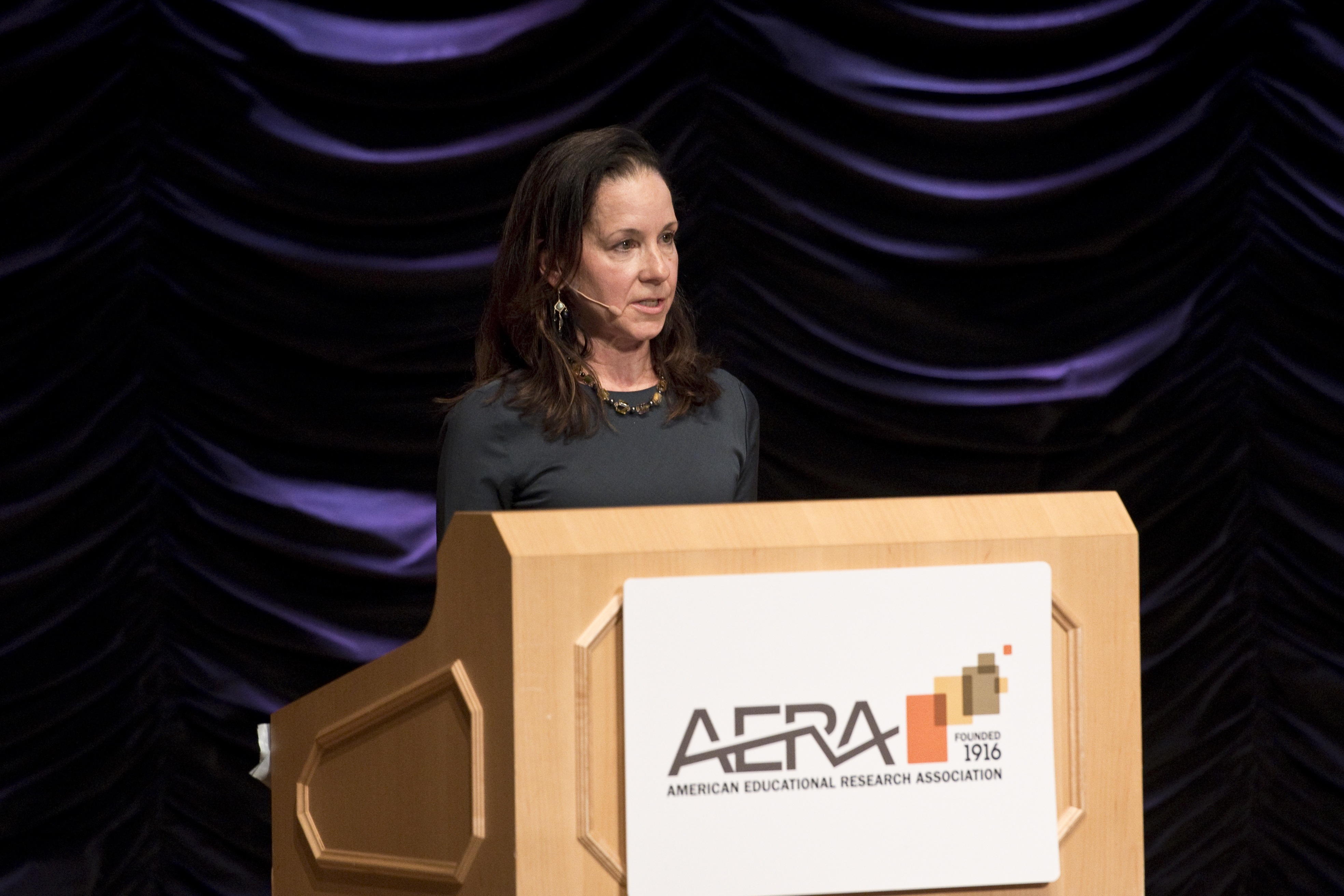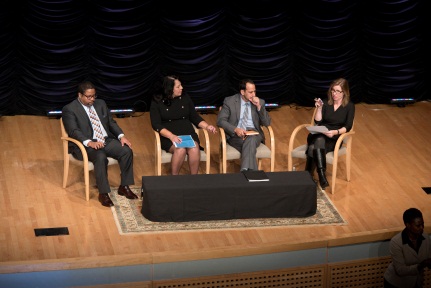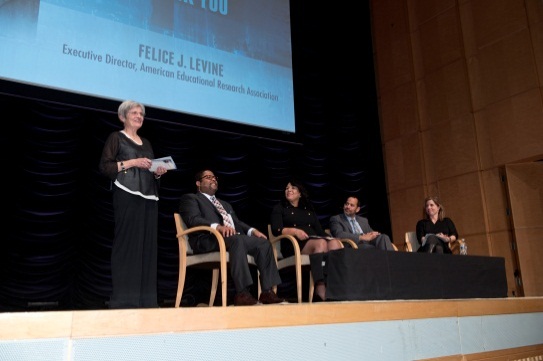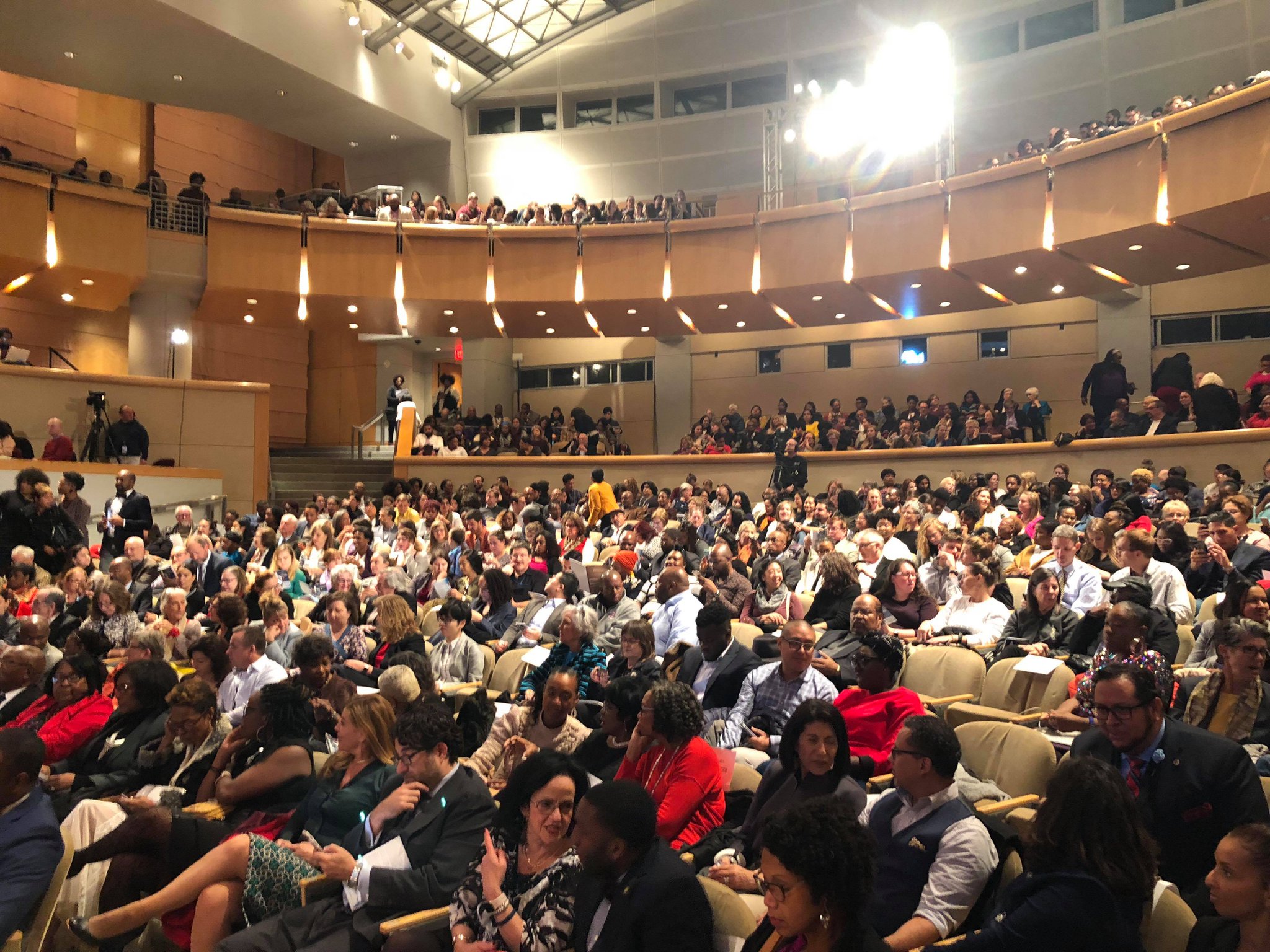October 2018
|

H. Richard Milner IV
|
Milner's Talk Followed by Discussion Forum
On October 25, H. Richard Milner IV delivered the 15th Annual Brown Lecture, “Disrupting Punitive Practices and Policies: Rac(e)ing Back to Teaching, Teacher Preparation, and Brown,” to a packed house of more than 900 at the Ronald Reagan Building & International Trade Center in Washington, D.C. The talk was followed by an open discussion forum and was joined by more than 450 online viewers from around the world.
Milner, a leading scholar of urban education and teacher education, is Cornelius Vanderbilt Endowed Chair of Education and Professor of Education in the Department of Teaching and Learning at Peabody College of Vanderbilt University. Milner's research examines practices and policies that support teacher effectiveness in urban schools. In 2006, he received the AERA Early Career Award; he became an AERA Fellow in 2016. He was also honored with the AERA Outstanding Reviewer Award in 2015 and 2017 for his work on the editorial board of Educational Researcher.
|

AERA President Amy Stuart Wells
welcomes attendees
|
AERA President Amy Stuart Wells welcomed the audience, noting that the Brown Lecture serves as an annual reminder of the role research plays in advancing equality in education.
In his talk, Milner examined the conflation of discipline and punishment practices, the Brown decision’s relationship to curriculum, and the results of an exploratory survey from teachers about the importance of race.
He began his talk with an anecdote about a teacher who, while disciplining a group of young students for not using their “indoor voices,” focused her reprimands on one Black student rather than the group as a whole. “What I observed was a group of five students yelling and not using their indoor voices, but this teacher heard only one student, Jamal,” said Milner. “I wondered how this singling out may have affected Jamal’s self-concept, voice, and identity.”
Reflecting on Brown v. Board of Education, Milner explained that the intentions of the Brown decision, particularly racial equity and justice, have yet to be realized. Milner shared segments of a video interview in which Willie Williams, a retired teacher and administrator from Alabama, shared what the Brown decision meant to Black students and teachers, why Black teachers were critically important before and after segregation, and what can be learned from the example of Martin Luther King Jr. as we attempt to disrupt punitive practices and policies.
Milner elaborated on the fact that school curriculum practices have had an exclusionary effect on Black students, citing Elliot Eisner’s three forms of curriculum: explicit, implicit, and null. “Historically and currently, the absence of providing curriculum opportunities that are germane to student success and healing is a form of punishment,” said Milner. “Curriculum is a form of punishment when we don’t provide spaces for students to unpack what’s happening in society.”
Milner also discussed results from the Teachers’ Race Talk Survey, an exploratory national survey that examines teachers’ beliefs about the importance of race in curriculum and instructional practices, teachers’ preparedness to discuss race, and teachers’ views on how to address institutionalized violence and racism with their students.
According to the survey, the vast majority - 86 percent - of teachers believed race was important to talk about. But among those same teachers, 55 percent reported that they did not feel prepared to have those conversations. The topic of police violence against unarmed Black men reported an even stronger decrease, to 33 percent.
“My friends and colleagues, we are talking about our children, the heartbeats of our future,” concluded Milner. “We have a moral, social, and emotional responsibility to create systems to ensure that our children have a fighting chance to maximize their humanity. I hope you will be brave and strong enough to disrupt punitive policies and practices.”
|

Discussion Forum Participants
(left to right): Richard Milner, Leslie
Fenwick, Peter Shulman, and Emily
Hanford
|
Milner’s lecture set the stage for a discussion forum in which the audience and online viewers were invited into a “living room” setting for a conversation with Milner and leaders from policy sectors.
Emily Hanford (APM Reports) moderated the discussion, and Leslie T. Fenwick (Dean Emeritus and Professor, Howard University School of Education) and Peter Shulman (CEO, Urban Teachers) served as commentators. Open microphones in the theater allowed for audience members, who included current and retired teachers, school administrators, advocacy and non-governmental organization representatives, and AERA members, to ask questions on a variety of topics.
In their comments, Fenwick and Shulman emphasized the importance of Historically Black Colleges and Universities in their preparation of Black teachers and others; the necessity of recruiting and retaining high-quality teachers, particularly Black male teachers; and state policies supporting teachers in urban areas, among others.
|

AERA Executive Director Felice J.
Levine offers closing comments
following the discussion forum
|
AERA Executive Director Felice J. Levine convened the formal program, underscoring the importance of the Brown Lecture as an annual reminder that research can be a powerful force for social change and justice. Levine also welcomed attendees to continue the conversation at the buffet reception.
The lecture was made possible through the generous support of the 20 Friends of Brown: American Anthropological Association; American Association of Colleges for Teacher Education; American Institutes for Research; American Political Science Association; American Statistical Association; Donna Ford Attallah College of Educational Studies at Chapman University; Drexel University School of Education; Educational Testing Service; Foundation for Child Development; Indiana University Bloomington School of Education; Institute for Educational Leadership; Miami University College of Education, Health and Society; Peabody College of Education and Human Development at Vanderbilt University; Rutgers University Graduate School of Education; Sage Publications, Inc.; Society for Research in Child Development; Spencer Foundation; the George Washington University Graduate School of Education and Human Development; University Council of Educational Administration; and University of Maryland College of Education.
The 2019 AERA Brown Lecture and discussion forum will be held on October 24, 2019. The Brown Lecture Selection Committee is currently accepting nominations for next year’s lecture.